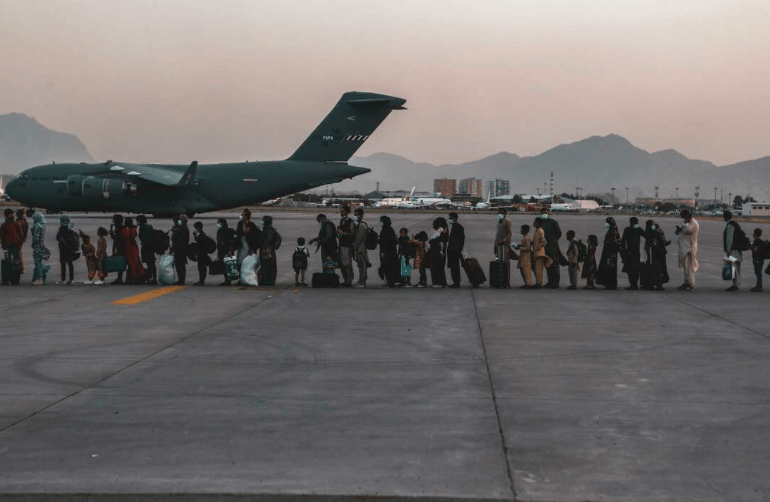Aug. 16, Natalie Nanasi, assistant professor of law at the SMU Dallas Dedman School of Law and co-author Joo Yeun Paek, for an op-ed calling for Congress to resume consideration for, and pass, the Afghan Adjustment Act because a year after the fall of Kabul tens of thousands of Afghan refugees in the U.S. remain in limbo. Published in the San Antonio Express-News under the heading A year later, Afghan refugees still need U.S. help: https://bit.ly/3PsrqLJ
This week marks the one-year anniversary of the fall of Kabul. The heart-wrenching images of Afghans hanging on airplane wings to escape the advancing Taliban have largely faded from our collective memories, crowded out by the more recent suffering of Ukrainian refugees and the ongoing debates over U.S. border security.
The daily challenges faced by Afghans who sought safety in the U.S. have similarly been largely ignored or forgotten.
By Natalie Nanasi and Joo Yeun Paek
This week marks the one-year anniversary of the fall of Kabul. The heart-wrenching images of Afghans hanging on airplane wings to escape the advancing Taliban have largely faded from our collective memories, crowded out by the more recent suffering of Ukrainian refugees and the ongoing debates over U.S. border security.
The daily challenges faced by Afghans who sought safety in the U.S. have similarly been largely ignored or forgotten.
Our client, “Dr. H,” is one of those refugees. A 26-year-old medical resident who worked for a U.S. pharmaceutical company, Dr. H fled to the U.S. after the Taliban takeover, credibly fearful she would be stoned, tortured or executed for being an educated and progressive woman. But unlike the rapid deterioration of the United States’ exit from Afghanistan, Dr. H’s time in the U.S. has been marked by drudgery and uncertainty.
Dr. H has been in limbo since the day she set foot on U.S. soil. She was told she would have to wait up to six months to get an ID, work permit and benefits such as medical insurance and food stamps. Calls to her caseworker and career counselor went unanswered. Months after her arrival in the U.S., Dr. H found herself in a small hotel room, not knowing what would happen next and fearful she would soon run out of food, medicine and clothing. As she said, “I felt hopeless. I fled Afghanistan to claim my own freedom, but here I was, still not the master of my fate.” Moreover, these immediate and overwhelming stressors sapped time and attention away from her asylum application, which was necessary to prevent her deportation.
The problems Dr. H faces are not unique, nor are they the fault of the well-meaning employees and volunteers at refugee resettlement agencies across the U.S. The systems in place to support refugees in this country are broken as a result of years of neglect. In 2016, the year before Donald Trump was inaugurated as president, the United States welcomed 85,000 refugees. By the time he left office, that number had plummeted to 12,000. In those four years, more than one-third of local resettlement agencies closed or suspended operations. The Biden administration has worked to restore our nation’s humanitarian ideals, but the influx of refugees from Afghanistan and Ukraine has overwhelmed the decayed system, creating substantial backlogs at agencies already lacking funds and personnel.
Frustrated by months of inaction, Dr. H took matters into her own hands. She left Florida, despite caseworkers warning her she could lose all her benefits. She now has an apartment, job and a pending asylum application. “I am finally in control of my own future,” she said. “I know that I was among the very lucky few to have caught a flight out of the mayhem in Kabul and that I was given a rare opportunity for a free life in the United States. For this reason, I will always be grateful to the U.S government and its people.”
But other Afghan refugees have not been as fortunate. Many feel helpless watching the clock run down on their temporary immigration status as they are trapped in the bureaucratic morass of resettlement paperwork and a convoluted, backlogged asylum system.
Congress could alleviate this burden by passing the Afghan Adjustment Act,which would provide a direct pathway to permanent residency for certain Afghan evacuees. The bill is stalled due to unfounded Republican concerns about security (all applicants have been and will continue to be thoroughly vetted) and the shifting of lawmakers’ attention to the Ukrainian refugee crisis.
One year ago, the lives of tens of thousands of Afghan civilians were altered in an instant, although their plight can be tied directly to decades of military and political interventions by the United States. Our country must acknowledge its share of responsibility for the chaos in Afghanistan and also the troubles facing Afghans who have sought refuge in the U.S. We cannot forget, and should not neglect, our allies in their time of need.
Natalie Nanasi is an associate professor and the director of the Hunter Legal Center for Victims of Crimes Against Women at the SMU Dallas Dedman School of Law. Joo Yeun Paek is a former student in the Hunter Legal Center for Victims of Crimes Against Women at the SMU Dedman School of Law.


